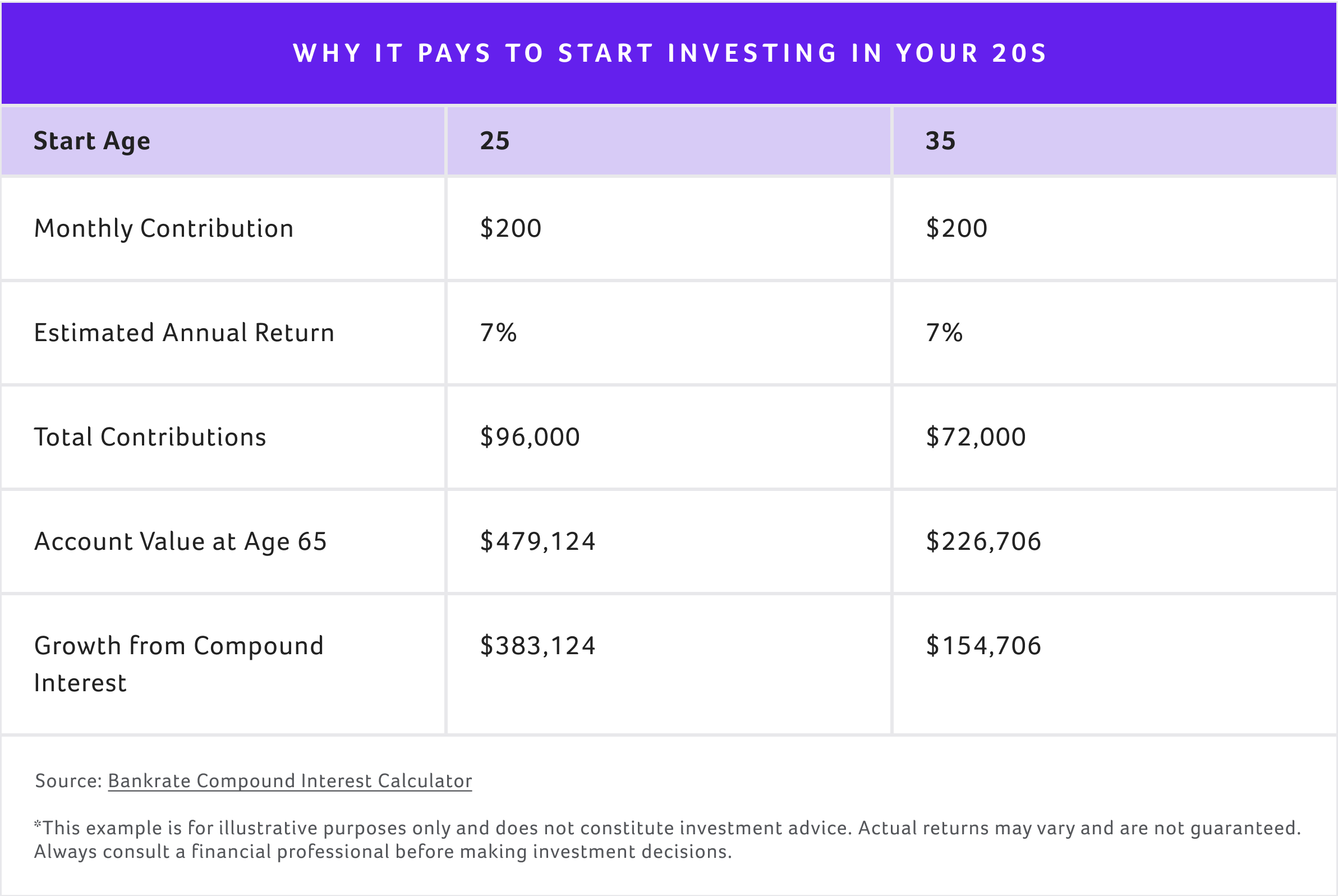The fact that you’re reading this article shows that you’re already serious about creating a financial future your 30-year-old self will thank you for. So congrats on that, because your 20s can be a powerful decade to lay the foundation for long-term financial stability.
In this post, we’ll walk you through nine, actionable, smart money moves to help you get ahead and establish healthy money habits for life.
Why your 20s matter for financial planning
The earlier you start planning for the future, the better off you’ll potentially be – financially – later in life. And while things like retirement may feel like a long way off, there is power in building towards a solid financial future, at any age.
When it comes to financial planning in your 20s, there’s a lot to consider. You may be facing student loan debt or taking on your first “major” job, or perhaps even thinking about buying a home or starting a family. On the other hand, you might still be living at home with your parents in order to save money, and you’re enjoying some freedom to travel and pursue your interests.
Wherever you are on your life path, no doubt you have financial obligations, such as paying your bills while still enjoying what life has to offer. So our best financial advice for 20-year-olds starts with creating financial goals for yourself. Ask questions like:
- What’s important to you right now?
- What kind of lifestyle do you want to have 5, 10, 15 years from now?
Knowing the things that matter most to you–now and in the future–can be a good starting point for determining simple ways to build toward the life you want.
Get Ahead of Paying Your Bills
Paying bills on time is a smart money move in your 20s. With Wisely®, you can pay bills online and schedule payments in advance to help ensure you never miss a due date.
How to manage money in your 20s: 9 smart financial decisions
If you’re wondering what you can do with money in your 20s, this section should help. It’s all about smart money strategies–for spending, saving and investing–to help you achieve your financial goals.
Here are nine tips to help you manage money in your 20s:
- Split your direct deposit to automate savings.
- Use the 50/30/20 rule to build a balanced budget.
- Create a budget—and actually use it.
- Start an emergency fund.
- Try the envelope budgeting system.
- Pay off high-interest debt.
- Start saving for retirement now.
- Set financial goals and review them often.
- Build great credit and monitor regularly.
Let’s take a closer look:
1. Split your direct deposit to automate savings.
Many employers offer not only direct deposit, but also the ability to split your direct deposit into two different accounts. This can be particularly helpful when it comes to automating your savings. (Think: Allocate and automatically deposit a certain amount from each paycheck into a separate saving account–so you won’t even see it in your main account.) This “pay yourself first” strategy can make saving feel effortless and helps keep your savings from getting mixed in with your everyday spending money. This can provide a more accurate picture of what’s actually available for bills, utilities, and day-to-day expenses.
If you wish to take it a step further, you may be able to split your direct deposit into multiple accounts; for example, one for savings, one for bill payments, and one for everyday expenses. Leveraging your employer’s split deposit options is a smart way to manage money in your 20s and help you build healthy financial habits for years to come.
2. Use the 50/30/20 rule to build a balanced budget.
Feeling ghosted by your money at the end of every month? It might help to apply the 50/30/20 rule to your finances. This is a basic budgeting approach that suggests dividing your pay into the following buckets:
- 50% on needs – like rent, groceries, phone, car insurance, loan payments
- 30% on wants – such as dining out, shopping, travel, streaming services
- 20% on savings – think: emergency fund, savings, retirement investing
This strategy can help you meet your financial obligations and control spending while still putting money in your pocket for things like going out with friends or splurging on a new pair of shoes.
3. Create a budget—and actually use it.
A lot of people keep track of their budgets “in their heads,” but that’s a lot to keep track of, mentally. We recommend writing it all down to see exactly how money comes in and goes out every month, right down to the dollar. Using a basic budgeting template can help. Money management in your 20s is all about learning budgeting basics and creating good financial habits.
4. Start an emergency fund.
One of the smartest saving strategies for 20-somethings is building an emergency fund. Why start an emergency fund? Because life happens, often unexpectedly. Your car needs a new tire. Your dog gets sick and needs veterinary care. Your roommate bails on you and you’re obligated to pay next month’s rent. And on and on!
Adulting is real, and having an emergency fund can help lessen the pain when things come up that you hadn’t budgeted for. Keep in mind, you can start small, setting aside just $25 or $50 a month at first.
A target milestone for your emergency fund could be $500 or $1,000, depending on what’s realistic for you. Having a lump sum set aside could help cover some major expenses if they come up. As you become more financially savvy and confident around money in your 20s, start thinking about growing that emergency fund large enough to sustain you if you ever happen to be out of work for a few months. Having three to six months’ worth of cash reserve in savings can help provide a strong financial cushion for those worst-case scenarios.
5. Try the envelope budgeting system.
Some people find it helpful to divide their money into envelopes. Imagine having one envelope just for grocery money, one for fun activities, and one for personal shopping. The idea is: You set aside a certain amount of cash for each category. Once the cash in each envelope is spent, you don’t spend any more money in that category until your next pay period. Having a fixed amount of money in each envelope may help control your spending in those categories. You can also set up savings envelopes online.

Automate Your Savings into Envelopes
Like the savings envelope idea? With Wisely you can do it online, automating your savings into different “envelopes” or categories, and easily transferring funds between envelopes.
You may be wondering if you have the discipline to stick to the envelope plan. It does take some practice and willpower to keep your promises to yourself around budgeting. This is where certain tactics like “loud budgeting” may come in handy. Loud budgeting is a concept that took off on social media as people in their 20s, in particular, found it helpful to get “loud” with friends and family about their financial goals. By letting others know what’s in your budget–and more importantly, what’s not–it may be easier to decline invitations to events and activities that cost more than you want to spend.
6. Pay off high-interest debt.
Debt can put a serious damper on your financial goals. If you have high-interest credit cards, you probably know the feeling of throwing money at a balance that never seems to go down. We live in an instant gratification society where we’re often tempted to live beyond our means–on credit cards, loans, and buy now, pay later plans–that can ultimately cause a lot of stress and hinder our ability to “get ahead.”
If this sounds familiar, your 20s are a great time to get a handle on debt and establish good credit. Keep in mind, we’re not talking about student loans or mortgages here, but consumer debt. Find out more about responsible spending and the snowball vs. avalanche method of debt repayment.
7. Start saving for retirement now.
A surefire way to plan for the future in your 20s is through a retirement plan, like a company-sponsored 401(k), especially if your employer offers “matching contributions.” This means you could be getting “free money” from your employer, and it’s another smart way to pay yourself first – by investing in your future vs. only thinking about the here and now.
If your job doesn’t offer retirement benefits, you may want to explore other investment options like a Roth IRA, a retirement account where you contribute after-tax money and your investments grow tax-free. The beauty of investing in a retirement plan like a Roth or 401(k) is that you benefit from the power of compound interest. Here’s how:
Let’s say you invest $200 a month into a Roth IRA starting at age 25, and you earn an average 7% annual return.
By age 65, you could have nearly $500,000
(You only contributed $96,000, the rest is compound growth!)
Now, let’s say you wait until age 35 to start investing.
By age 65, you’d have only about $227,000
Same $200/month, same return—just 10 years later. That 10-year head start could give you more than double the retirement savings.
Bottom line: The earlier you start, the more time your money has to grow on itself. Even small amounts add up when time is on your side.

Interested in the stock market? Keen on crypto? While investing in assets has upside potential, it also carries significant risk. If you have money “leftover” and want to play with different types of investments, a good rule of thumb is:
- Only invest what you can afford to lose
- Focus on long-term returns vs. short-term gains
- Avoid get-rich quick scenarios
Investing in your future self involves developing healthy financial habits that build up to success over time. If it sounds too good to be true…well, you know the rest.
8. Set financial goals and review them often.
Financial goals in your 20s may be short-, medium-, or long-term, from saving up for a friend’s destination wedding to putting a down payment on a car to buying your first home a few years down the road. And while it may feel overwhelming at first to imagine all the money you need for the things you want in life, it helps to start with a goal and a written plan–like having a financial GPS to help you get where you’re going.
As upcoming opportunities and invitations come to mind, make a habit of dropping them into a notes app on your phone. Consider naming your financial goals in ways that inspire you, like:
🌴 Amazing trip to the Bahamas
🚘 New car that I love
🏡 2BR house with a yard in a great neighborhood
Keeping your goals handy and visible at all times can help you stay inspired to spend, save, and invest wisely–and stay on track.
9. Build great credit and monitor regularly.
Your credit score plays a part in all kinds of situations, such as:
- Being eligible for a mortgage
- Getting a good interest rate on a car loan
- Qualifying for a lower-interest credit card
Among the most important financial goals in your 20s should be establishing credit and maintaining a good credit score. Then, credit monitoring is key for staying on top of your credit – in your 20s and beyond.

Keeping your goals handy and visible at all times can help you stay inspired to spend, save, and invest wisely–and stay on track.
Bonus tips: Quick financial advice for 20-year-olds
Still wondering how to get ahead financially in your 20s? Here are some quick wins and easy action steps. Remember, it’s a marathon not a sprint when it comes to achieving financial goals. You’ll likely have setbacks, but if you’re committed to practicing healthy financial habits, just keep getting back on track.
Okay, here is our bonus financial advice for your 20s. Pick a few to try this week to start building momentum:
Making money
- Invest in yourself. Getting higher education or skills could help you make more money.
- Start a side hustle. Turn passions into income.
- Create passive income. Sell a digital product or service that generates ongoing revenue.
- Diversify your income. Look beyond your 9-to-5 for other opportunities.
Saving and investing
- Learn investment basics. Smart decisions start with financial literacy.
- Use rewards programs. Earn perks on purchases like meals and gift cards.
- Cancel unused subscriptions. Eliminate recurring costs for things you don’t use.
- Cut back on streaming. Reduce monthly costs and save the difference.
- Cook at home. Meal prep to avoid overspending on takeout.
Money management
- Set fun-money limits. Carry a set amount of weekly “play” cash.
- Shop smart. Make a list, skip impulse buys, and avoid bulk if not needed.
- Rethink ‘buy now, pay later.’ These plans can still lead to overspending.
- Save windfalls. Use tax refunds or bonuses to build savings or pay off debt.
- Avoid lifestyle creep. Higher income shouldn’t mean higher expenses.
Building credit
- Track your credit. Having instant access to your credit score and financial obligations is a great way to help establish financial responsibility.
- Get your free credit reports. Request one from each bureau yearly at www.annualcreditreport.com.
How to save money in your 20s with Wisely
Willpower alone isn’t a great financial plan. To be successful, you need systems and tools that make it easy to practice healthy financial habits. That’s where Wisely comes in. Our prepaid debit cards have a wide range of features to help you manage your finances in your 20s, from early direct deposit and online bill payment to budgeting tools to help you stay on track.
DOING FINANCES IN YOUR 20s WISELY
When you need to make smart money moves, make them Wisely.
- Get paid up to 2 days early
- Automatic transfers to savings
- Online bill payments and scheduling
- Rewards program for the ways you like to dine, shop, and travel

By the Wisely Team
Ready to achieve your financial goals in your 20s? Start off Wisely.

Footnotes
This content is for informational purposes only and may have been derived, with permission, from a third party. While we believe it to be accurate as of the date of publication, it does not constitute the rendering of legal, accounting, tax, or investment advice or other professional services by ADP and it is being provided without any warranty whatsoever. Please consult with appropriate professionals related to your individual circumstances.
The Wisely Pay Visa® is issued by Fifth Third Bank, N.A., Member FDIC, pursuant to a license from Visa U.S.A. Inc. The Wisely Pay Mastercard® is issued by Fifth Third Bank, N.A., Member FDIC, pursuant to license by Mastercard International Incorporated. The Wisely Direct Mastercard is issued by Fifth Third Bank, N.A., Member FDIC. ADP is a registered ISO of Fifth Third Bank, N.A. The Wisely Pay Visa card can be used everywhere Visa debit cards are accepted. Visa and the Visa logo are registered trademarks of Visa International Service Association. The Wisely Pay Mastercard and Wisely Direct Mastercard can be used where debit Mastercard is accepted. Mastercard and the circles design are registered trademarks of Mastercard International Incorporated.
ADP, the ADP logo, Wisely, myWisely, and the Wisely logo are registered trademarks of ADP, Inc.
Copyright © 2026 ADP, Inc. All rights reserved.
By clicking 'Leave', you will exit myWisely and be directed to a third party website which may have different privacy and security settings.

